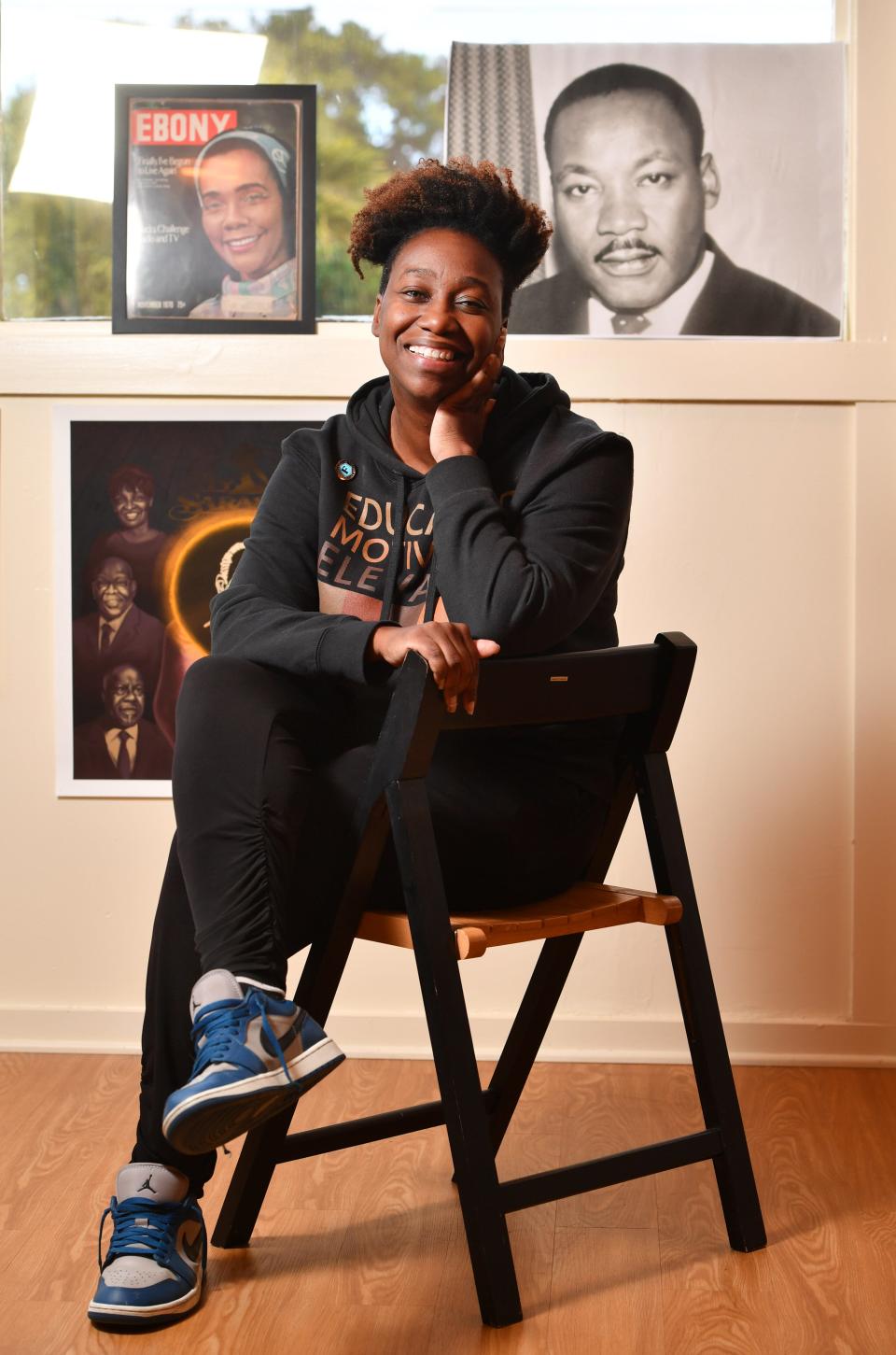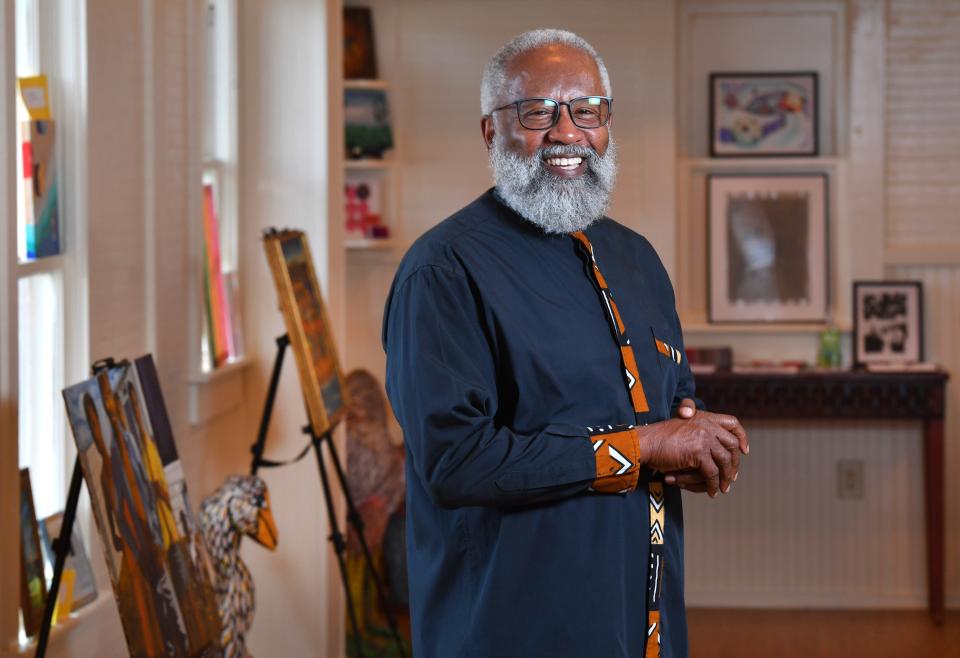Faces of Black Heritage: A look at Black heritage with Sarasota leaders, trailblazers
In celebration of the nationally observed and recognized Black History Month, the Herald-Tribune is introducing the Faces of Black Heritage series, showcasing local Black leaders and changemakers who share their views on Black heritage and history.
Sarasota plays an integral part in the overall fabric of the country's Black history dating back to the early 1900s when the first settlers arrived here — among them was Sarasota's first Black pioneer, Leonard Reid. The historic Reid house, now home to Sarasota's first African-American cultural and history museum, is one of the many pieces of Black history that paved the way for today's residents.
Here's what culture, history, and heritage mean to these leaders and trailblazers.

OSA ATOE:
Hometown: Lorton, Virginia
Current city: Sarasota, since 2020
Occupation: Studio potter
Age: 45
On observing Black Heritage Month: "I don’t celebrate it. I think about Black history 365 days of the year. And in the work that I do and the organization I lead, we are talking about Black history all the time. I'm always referencing the work from the continent (Africa) to this country. I am always spreading the word about our history we don’t confine it to one month of the year."
Black history fact you wish you knew as a child: "That slavery is not the only history for us. It is not the complete history of Africans or the diaspora. I wish I had known more about the variety of circumstances that descendants of Africans come from. That information has been around for a long time but the door to get to that information has been hidden from us. Not every Black person in the Americas is a descendant of slaves ... I think not knowing that has created a community of people who have been internalizing the message that every person with Black skin has the same history in this country. That is wrong and it changes the way that we feel about ourselves historically over time."
Where do you go or where do you look for information about African-American and Black history and culture? "Books. I feel that that is the most complete way to gain knowledge."
What’s one piece of Black literature — either contemporary or historical, banned or available — that you feel that everyone should read? "The Color Purple because it's timely and is being reintroduced. The focus of that book is on the Black woman’s experience and spiritual and personal relationship with God. The story also spans the U.S. and Africa. I feel like parts of the book are a little dated but some parts are timeless. Alice Walker was a brilliant, feminist thinker. She was a leader in womanism and Black feminist thought."
How do you envision the future for Black Floridians and Black Americans? Please share with us your Afrofuturism dreams. "The future for me is leaning into the values of the past. I think leaning into our collective identity and ideas around communalism. So most African societies and most societies in general are communal societies... I have a window into that being from a Nigerian American family. Thinking about yourself not just as an individual but as part of a family and a community, these like older values that were reflected in African society. This path of individualism that we're on is not going to serve us. It's just another facet of capitalism. I think those communal mindsets are actually going to move us forward into the future."
Favorite soul food dish: Black-eyed peas
Favorite movie: Paris Is Burning
Favorite adult drink: Coconut rum, ginger beer, and lime juice (Atoe's version of a dark and stormy)
Life motto, favorite quote or saying: "Keep it simple."
Favorite historical city or site for Black heritage: New Orleans, Louisiana

NEIRDA THOMPSON-PEMBERTON
Hometown: Brooklyn, New York
Current city: Sarasota, since 2010
Occupation: Executive director of S.T.E.A.M., education nonprofit, FUNducation
Age: 30-something
On observing Black Heritage Month: "I celebrate Black Heritage Month because it is an opportunity to spotlight the contributions of Black Americans to society and our history. I advocate for spreading awareness about the plights of Black Americans for equity in education."
Black history fact you wish you knew as a child: "I wish I had learned about Black female STEAM pioneers."
Where do you go or where do you look for information about African-American and Black history and culture? "Our community."
What’s one piece of Black literature — either contemporary or historical, banned or available — that you feel that everyone should read? "Any work by Maya Angelou."
How do you envision the future for Black Floridians and Black Americans? Please share with us your Afrofuturism dreams. "I envision and hope to see, diversity in innovation and workforce."
Favorite soul food dish: Sweet Potatoe Pie
Favorite movie: Hidden Figures
Favorite adult drink: Chocolate Martini
Life motto, favorite quote or saying: "The function of education is to teach one to think intensively and to think critically. Intelligence plus character–that is the goal of true education.”(Dr. Martin Luther King, Jr.)
Favorite historical city or site for Black heritage: Tulsa, Oklahoma (Greenwood/Black Wall Street)

DAVID WILKINS
Hometown: Evanston, Illinois
Current city: Sarasota, since 2018 and vacationing here since 2004
Occupation: retired attorney, president of Manasota ASALH
Age: 71
On observing Black Heritage Month: "I was a history major. I realized as I got older what I missed growing up. Once I discovered more about myself and our (Black) history, and as I just became more aware of the world, it just came naturally to me. It wasn’t really celebrated where I grew up so as I've gotten older and had a family of my own we have made it a part of our lives."
Black History: ASALAH Freedom School is a statement about the power of learning and community in Sarasota
More: New murals in historic Overtown pay homage to Sarasota's Black pioneers
Black history fact you wish you knew as a child: "It's not really a fact but a wish I could have an opportunity again ... When I was around 13, Dr. King spoke at my school. I was clueless, I knew who he was, but not fully. I was a kid. I wish I could revisit that moment and hear him knowing who he was, fully. I missed out on what could have been sort of a seminal encounter and only because I was ignorant."
Where do you go or where do you look for information about African-American and Black history and culture? "Books. I love to read, and spent a lot of time in libraries growing up to stay out of trouble."
What’s one piece of Black literature — either contemporary or historical, banned or available — that you feel that everyone should read? "The Souls of Black Folks (W.E.B DuBois) or Before the Mayflower (Jerome Bennett). Before the Mayflower was the first real Black history book I read in high school. Those two are a good place to start."
How do you envision the future for Black Floridians and Black Americans? Please share with us your Afrofuturism dreams. "I don't believe we, my generation, we won’t see it, but I firmly believe there will be a time, an age when we will look back in amazement that it took us so long to get out of this repeated pattern... There is a future where history is not controversial; it will be accepted because the work has taken place. An example of that is modern-day Germany, now, where the people have accepted all of their history and its implications. My Afrofuturistic vision is very much aligned with Sci-fi. History will be studied and people will understand and value the truth."
Favorite soul food dish: Collard Greens
Favorite movie: Roots Series
Favorite adult drink: Cabernet
Life motto, favorite quote or saying: "I can do all things through Christ who gives me strength." (Philippians 4:13).
Favorite historical city or site for Black heritage: Montgomery, Alabama
Samantha Gholar covers social justice news for USA TODAY Network-Florida. Connect with her at sgholar@gannett.com or on Twitter: @samanthagholar
This article originally appeared on Sarasota Herald-Tribune: These local leaders share how they celebrate Black heritage everyday

